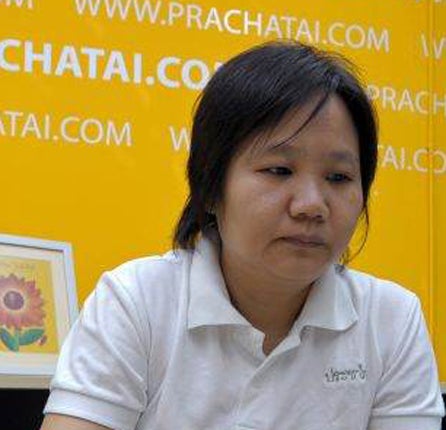Thai reporter faces jail for insult to king

Your support helps us to tell the story
From reproductive rights to climate change to Big Tech, The Independent is on the ground when the story is developing. Whether it's investigating the financials of Elon Musk's pro-Trump PAC or producing our latest documentary, 'The A Word', which shines a light on the American women fighting for reproductive rights, we know how important it is to parse out the facts from the messaging.
At such a critical moment in US history, we need reporters on the ground. Your donation allows us to keep sending journalists to speak to both sides of the story.
The Independent is trusted by Americans across the entire political spectrum. And unlike many other quality news outlets, we choose not to lock Americans out of our reporting and analysis with paywalls. We believe quality journalism should be available to everyone, paid for by those who can afford it.
Your support makes all the difference.Campaigners in Thailand have called for the dropping of charges against a journalist who is being is being prosecuted over comments posted on a news website that were critical of the country’s royal family. If convicted, she faces up to 50 years in jail.
In a case that is being seen as test of the country’s questionable commitment to free speech as well as an examination of its controversial “lese majeste” laws, a court in Bangkok is hearing evidence against Chiranuch Premchaiporn, director of an online news site called Prachatai, or Thai People. Ms Premchaiporn is not accused of posting the comments herself – with no small irony that person was acquitted in a separate hearing – but she is charged with failing to delete them from the website.
“Chiranuch should not be in the dock,” said Benjamin Zawacki, a regional spokesman for Amnesty International. “The comments for which she is being held responsible should not be prohibited in the first place, much less when they are posted by someone else.”
The evidence currently being heard against the 32-year-old journalist relates to charges covered by the so-called Computer-related Crimes Act of 2007, which deals with the liability of online intermediaries relating to national security. She has also been charged under the lese majeste legislation, in a case that will be heard subsequently.
While the lese majeste laws have existed for decades in Thailand, the punishments were sharply increased during the mid-1970s by one of the country’s many military-backed administrations. Now, an individual can be jailed for up to 15 years for any comment deemed to be critical of or harmful towards the ailing King Bhumibol or members of the 83-year-old’s family.
Experts say the laws have been increasingly invoked, and often to prosecute dissidents or members of the political opposition. Several leaders of the anti-government Red Shirt movement have pursued using lese majeste legislation and writers and journalists have been jailed.
At least 44,000 websites have been blocked. David Streckfuss, an American academic based in Thailand and author of a recent study of the lese majeste laws, said that from just one or two incidents a year two decades ago, in 2009 a total of 164 cases were brought to court.
“Unfortunately, it appears that in all of this political turmoil, lese majeste has become the preferred charge against political opponents, especially against the Red Shirts or those perceived to be sympathisers. The law has now become more than just a latent threat,” Mr Streckfuss said last year in an interview with Prachatai. “Thailand cannot claim to be democratic while at the same time arresting and trying hundreds of people for freedom of expression.”
Prachatai was founded in 2004 by Jon Ungpakorn, a winner of the Ramon Magsaysay award. It was established amid growing concern about threats to the mainstream media during the premiership of prime minister Thaksin Shinawatra, who was later ousted in a coup in 2006. Prachatai estimates that at the time when the offending remarks were posted, between April and August 2008, it was receiving up to 2,500 new comments every day. Ms Premchaiporn was the site’s only full-time moderator. She said that she removed the purportedly harmful comments when she was contacted by officials from the government’s ministry of information.
Press freedom campaigners say the case will do little to improve Thailand’s reputation. In a recent survey compiled by the group Reporters Without Borders, Thailand was positioned 153rd out of a total of 178 countries. In 2002, it had been in 65th position. Tyrell Haberkorn, a research fellow at the Australian National University, who has been studying press freedom in Thailand, said last night: “The effect of this is incredibly chilling This is sending a message that no matter where you write, be it online, be it on Facebook, then the state is paying attention.”
Join our commenting forum
Join thought-provoking conversations, follow other Independent readers and see their replies
Comments